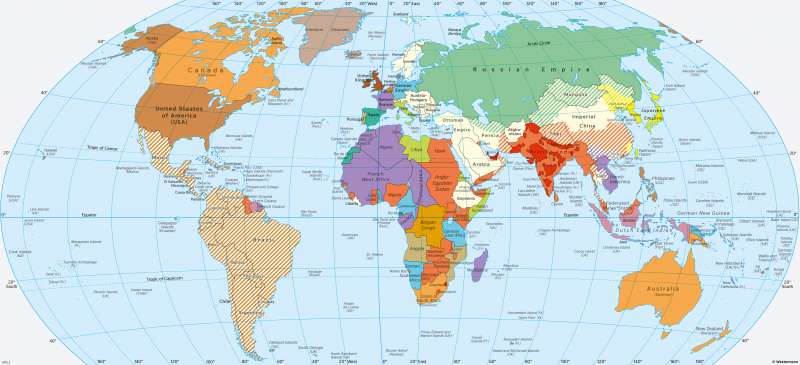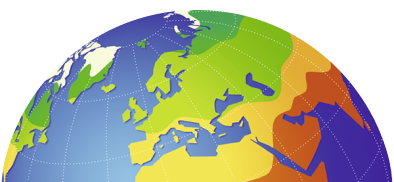The World - Empires 1914
The Age of Imperialism
978-3-14-100890-6 | Page 30 | Ill. 1

Overview
On the eve of the First World War, a handful of European states ruled over vast territories on other continents, with their overseas possessions often outnumbering their home territories many times over (see Colonial possessions of European powers 1914). This phenomenon is particularly visible in the example of the British Empire.
From colonialism to imperialism
Colonialism began with the European expeditions of discovery from 1492 onwards and was characterised by the fact that until well into the 19th century it was generally limited to the establishment of trading posts on the coasts. These were usually fortified militarily, but large-scale occupation - like that of the Spanish in Latin America from the 16th century onwards - was rather the exception. Although the hinterland of the coasts was already exploited, for example through the slave trade, there was not yet any permanent, institutionally, and militarily anchored foreign rule. The main colonial powers of this phase were initially Portugal and Spain, then also France, Great Britain and the Netherlands.
The character of colonialism changed with the rise of imperialism. Imperialism is the attempt to dominate other countries and peoples directly or indirectly by military, political and economic means in order to make them dependent and exploit them for one's own purposes. The most important goals of an imperialist policy are the conquest of sales and capital markets as well as raw material deposits and the achievement of geostrategic advantages. European rivalries over the possession of foreign territories intensified massively with the rise of imperialism. Only now did the almost complete, area-wide occupation of the African continent occur.
The colonial division of Africa
When the French conquered Tunisia in 1881 and the British Egypt in 1882, the interior of Africa was still largely unexplored. The imperial advance acted as a beacon. In the race for African colonies that now began, conflicts soon arose between the European states. To settle the disputes, the Congo Conference was convened in Berlin in November 1884. There, it was agreed that colonial ownership would be established by occupying a country - which intensified the competition for undeveloped territories.
The aim of the forced British colonial policy was a north-south connection between Egypt and South Africa. In a few years, the British incorporated Sudan, Kenya, Rhodesia and Bechuanaland, among others, into their empire, which already included Gambia and the Gold Coast. France, meanwhile, acquired vast territories in North and West Africa. By 1900, Europeans had almost completely divided the continent among themselves, apart from Ethiopia and Liberia. In 1919, the Versailles Peace Treaties divided the former German colonies among France, Britain and Belgium.
The forms of rule in the British Empire
By far the most important imperial power around 1914 was Great Britain. The country had laid the foundation for its rise to world power in the 17th century with the establishment of trading posts and colonies in America, Africa and Asia. In 1788, the colonisation of Australia and the expansion in the South Pacific began, in 1800 the British conquered Malta, in 1806 the Cape Colony, and in 1858 British India became a crown colony.
In the British Empire, there was a mosaic of different forms of rule. Crown colonies were directly subordinate to the London Colonial Office and governed by a governor. These were essentially smaller, easily controlled territories in the Caribbean, Hong Kong and Ceylon (now Sri Lanka), and countries such as Sierra Leone and Gold Coast (Ghana). Protectorates were also ruled directly, but not to the same extent (Kenya, for example). In colonially dominated areas, sovereign functions were exercised by a colonial administration headed by a governor. Former rulers and old political structures were usually completely replaced.
However, rule was also exercised indirectly ("indirect rule"). In India, for example, the power to govern smaller territories was often delegated to local rulers (princes, tribal elders). However, their power was limited to domestic politics and highly regulated. In British India, there were over 500 of such dwarf states, mostly in economically unproductive regions (mountains, semi-deserts, interior). In some places there was a British advisory council (for example in Zanzibar) that determined the policy of a local government.
Dominions were state-like entities that emerged from 1839 onwards (starting with Canada) through gradual transformation from colonies. In them, the white settler class exercised power, but they were still closely linked to the mother country. This also applies to New Zealand, Australia and the Union of South Africa. The model of dominions was also introduced in parts of Africa after the First World War.
Added to these possessions and colonies were areas of influence in China, Thailand and West Asia, where Britain had forced an opening of markets for its own economy. Here, consulates and advisers exerted informal influence on local governments, but there was no direct exercise of rule.
The other imperial powers
Countries like Belgium and Italy, which had entered the imperial race late, only gained their own colonies in the course of the division of Africa. However, like the Netherlands and Denmark, they never became imperial powers with global political ambitions. In this they differed from the German Empire, which, due to its growing economic power and rapidly built-up military potential, entered into competition with Great Britain in particular.
Japan and the USA also pursued imperial goals from the end of the 19th century. Japan had asserted its claims in the Far East against the Russian Empire, turned Taiwan and Korea into heavily exploited and repressively governed colonies and secured extensive influence in China with the help of a puppet government. The USA had acquired the Aleutian Islands, Alaska and some islands in the Bering Strait from Russia in 1867. In 1898, they conquered Puerto Rico, Guam and the Philippines in the war against Spain, and also annexed Hawaii. The spheres of influence of the new great power, which acted according to the principle of "America for the Americans" (Monroe Doctrine), included large parts of Central America and the Caribbean.




